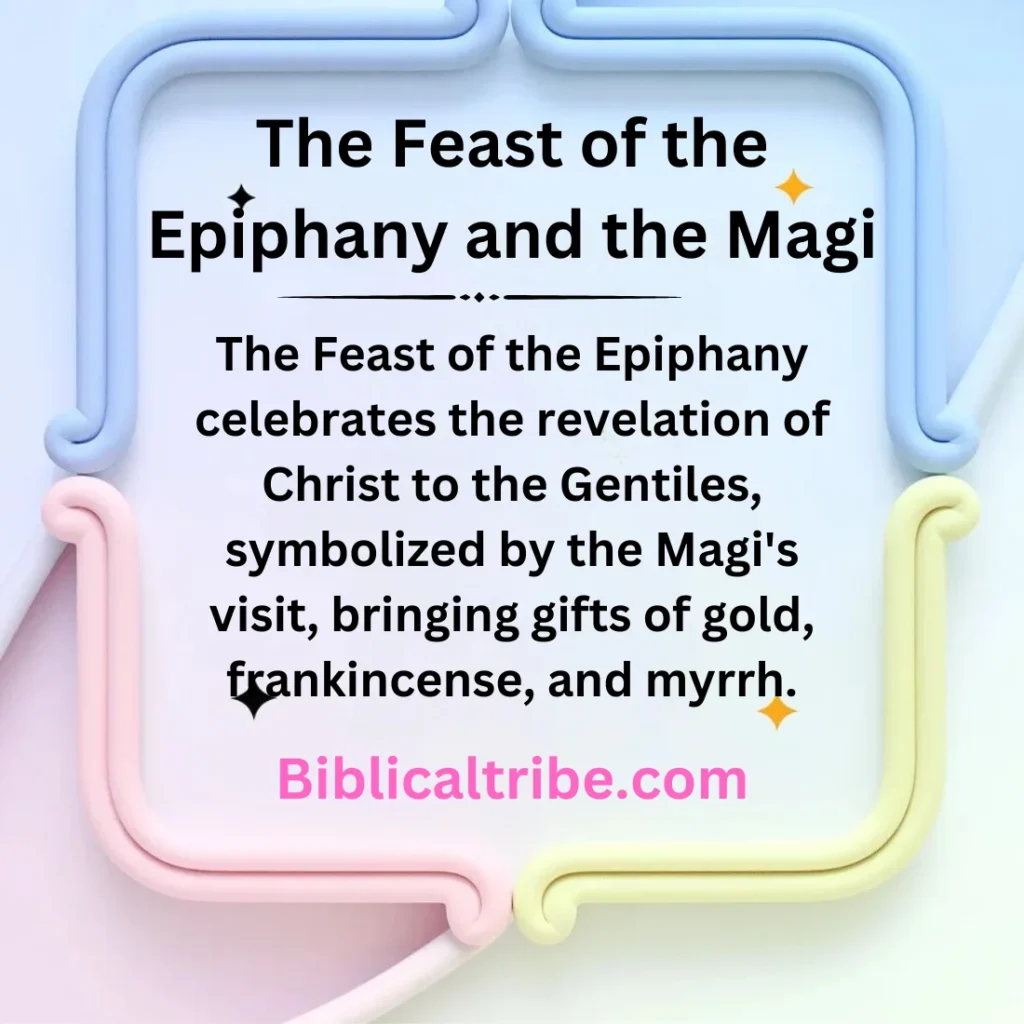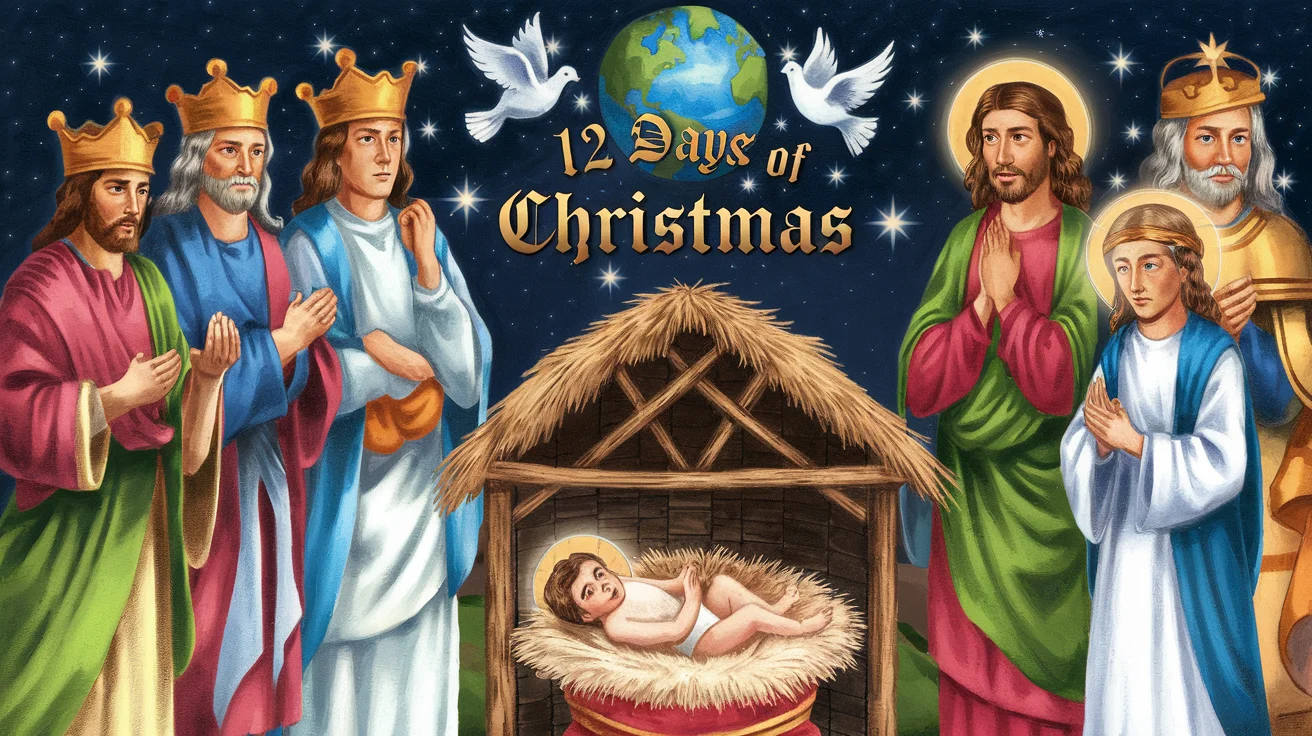Last Updated on November 4, 2024 by Ethan Richards
The classic Christmas carol “The 12 Days of Christmas” is a festive tune that’s beloved around the world. However, beneath its cheerful melody lies a wealth of Christian symbolism and historical context that many people might not be aware of.
This blog post will delve into the deeper meaning behind each gift in the song and explore how it connects to Christian beliefs and traditions.
We will also uncover the historical roots of the carol and its role as an educational tool in Christian history.
The Context & History Behind “The 12 Days of Christmas”

Historical Background
“The 12 Days of Christmas” is a traditional English carol dating back to the 16th century. Although the exact origins are somewhat unclear, it is believed to have been written in France and brought to England in the late 1500s.
The carol was first published in England in 1780, but its melody and lyrics likely existed in oral tradition long before this.
The 12 Days of Christmas refer to the period between December 25th (Christmas Day) and January 5th (Twelfth Night), which is traditionally a time of celebration in the Christian liturgical calendar.
Each day of this period has its own significance, culminating in the Feast of the Epiphany, which celebrates the visit of the Magi to the infant Jesus.
Cultural Significance
In Christian traditions, the 12 Days of Christmas are a time for feasting, celebrating, and reflection. This period marks the end of Advent and the beginning of the new year. Various Christian cultures have different customs for observing these days, but they all emphasize joy and thanksgiving for the birth of Christ.
Educational Purpose
Historically, the carol was used as a catechetical tool during times of religious persecution. In the 16th and 17th centuries, when Catholic practices were suppressed in England, the carol served as a way for Catholics to covertly express their faith. Each gift in the song was thought to represent a key aspect of Christian doctrine, allowing believers to teach and reinforce their faith under the guise of a popular holiday song.
The Biblical Meaning of Each Gift in “The 12 Days of Christmas”

Overview of Interpretation
The interpretation of the gifts in “The 12 Days of Christmas” is rooted in Christian symbolism. Each gift is believed to represent an element of the Christian faith, providing a way to reflect on the core teachings and beliefs of Christianity. Here’s a deeper look into what each gift symbolizes:
The Partridge in a Pear Tree: Representing Jesus
The partridge in a pear tree is often seen as a symbol of Jesus Christ, the central figure of Christianity. The partridge, known for its protective nature, is seen as a metaphor for Christ’s role as the protector and savior of humanity.
- Biblical References: Jesus is referred to as the “Good Shepherd” in John 10:11, who lays down His life for His sheep. The partridge’s protective nature mirrors this sacrificial love.
The Turtledoves: Symbolizing the Old and New Testaments
The two turtledoves in the carol are thought to represent the Old and New Testaments of the Bible. Turtledoves are often associated with peace and sacrifice in Scripture.
- Scriptural Connections: In the Old Testament, turtledoves were used in sacrifices (Leviticus 14:22). The New Testament builds on this sacrificial system by emphasizing Jesus as the ultimate sacrifice.
The French Hens: Embodiment of Faith, Hope, and Love
The three French hens are believed to embody the three theological virtues of faith, hope, and love.
- Biblical References: 1 Corinthians 13:13 highlights these virtues, stating, “And now these three remain: faith, hope, and love. But the greatest of these is love.” The French hens symbolize the Christian call to embrace these virtues in everyday life.
The Calling Birds: Referring to the Four Gospels
The four calling birds are interpreted as representing the Four Gospels: Matthew, Mark, Luke, and John.
- Scriptural Connections: Each Gospel presents a unique perspective on the life and teachings of Jesus, collectively providing a comprehensive account of His ministry.
The Gold Rings: Symbolizing the First Five Books of the Old Testament
The five gold rings are seen as a reference to the Pentateuch, the first five books of the Old Testament.
- Biblical References: These books—Genesis, Exodus, Leviticus, Numbers, and Deuteronomy—lay the foundation for Jewish law and Christian understanding.
The Origins of “The 12 Days of Christmas” as an Educational Tool
Historical Use
During times when Christians faced persecution, particularly in England under Protestant rule, “The 12 Days of Christmas” served as a covert means of teaching the faith. Each gift was a coded reference to a particular aspect of Christian doctrine, allowing believers to express their faith discreetly.
Persecution Context
In the 16th century, Catholics in England were often persecuted for their religious beliefs. The carol became a tool for passing on religious instruction in a way that could not easily be detected by authorities. Each verse of the song provided a mnemonic device to remember and teach key Christian teachings.
The Feast of the Epiphany and the Magi

Overview of the Feast
The Feast of the Epiphany, celebrated on January 6th, marks the end of the Christmas season and the revelation of Christ to the Gentiles through the visit of the Magi. This feast is an important celebration in the Christian liturgical calendar, commemorating the manifestation of Jesus as the Son of God.
Role of the Magi
The Magi, or Wise Men, are significant in Christian tradition for their journey to honor the newborn Jesus. Their gifts—gold, frankincense, and myrrh—symbolize Christ’s kingship, divinity, and suffering.
- Gifts of the Magi: These gifts are often seen as a prophetic foreshadowing of Jesus’ future roles and His mission.
The Mystery of the Magi and Their Symbolism
Identity and Journey
The Magi were scholars and astrologers from the East, likely Persia, who followed a star to find Jesus. Their journey represents the recognition of Jesus’ significance by the wider world, beyond just the Jewish community.
Gifts of the Magi
- Gold: Represents Jesus’ kingship.
- Frankincense: Symbolizes His divinity.
- Myrrh: Foreshadows His suffering and death.
The Son of the Right Hand and Benjamin’s Redemption
Biblical Reference
The phrase “Son of the Right Hand” refers to a position of honor and power. Benjamin, one of the twelve tribes of Israel, was known as the “son of the right hand” in Genesis 35:18.
Theological Implications
Benjamin’s story, including his redemption and blessings, is seen as a reflection of Christ’s role in redeeming humanity and His place of honor in the Kingdom of God.
The Role of Believers in the Eternal Kingdom
Christian Perspective
The carol’s symbolism invites believers to reflect on their role in the eternal Kingdom. It emphasizes living a life aligned with Christian values and preparing for the fulfillment of God’s promises.
Eternal Kingdom
In Christian theology, the eternal Kingdom of God is the ultimate destination for believers, where they will experience everlasting peace and communion with God.
Embracing the Deeper Meaning of Christmas
Summary of Insights
Understanding the Christian meaning behind “The 12 Days of Christmas” enriches our celebration of the holiday season. Each gift in the carol serves as a reminder of fundamental Christian beliefs and teachings.
Call to Action
As you celebrate Christmas, take time to reflect on these deeper meanings and integrate them into your holiday traditions. Embrace the rich symbolism of the season and let it inspire your faith and celebrations.
Conclusion
“The 12 Days of Christmas” is more than just a festive song; it is a treasure trove of Christian symbolism and historical significance. By exploring the deeper meanings behind each gift, we can gain a richer understanding of the Christmas season and its significance in the Christian faith. May this knowledge deepen your appreciation of the holiday and inspire a more profound celebration of its true meaning.

James Wilson is a renowned biblical scholar and dream expert, dedicated to exploring the spiritual dimensions of dreams. His in-depth knowledge and compassionate approach provide readers with valuable tools to understand and embrace the divine messages revealed in their dreams.










